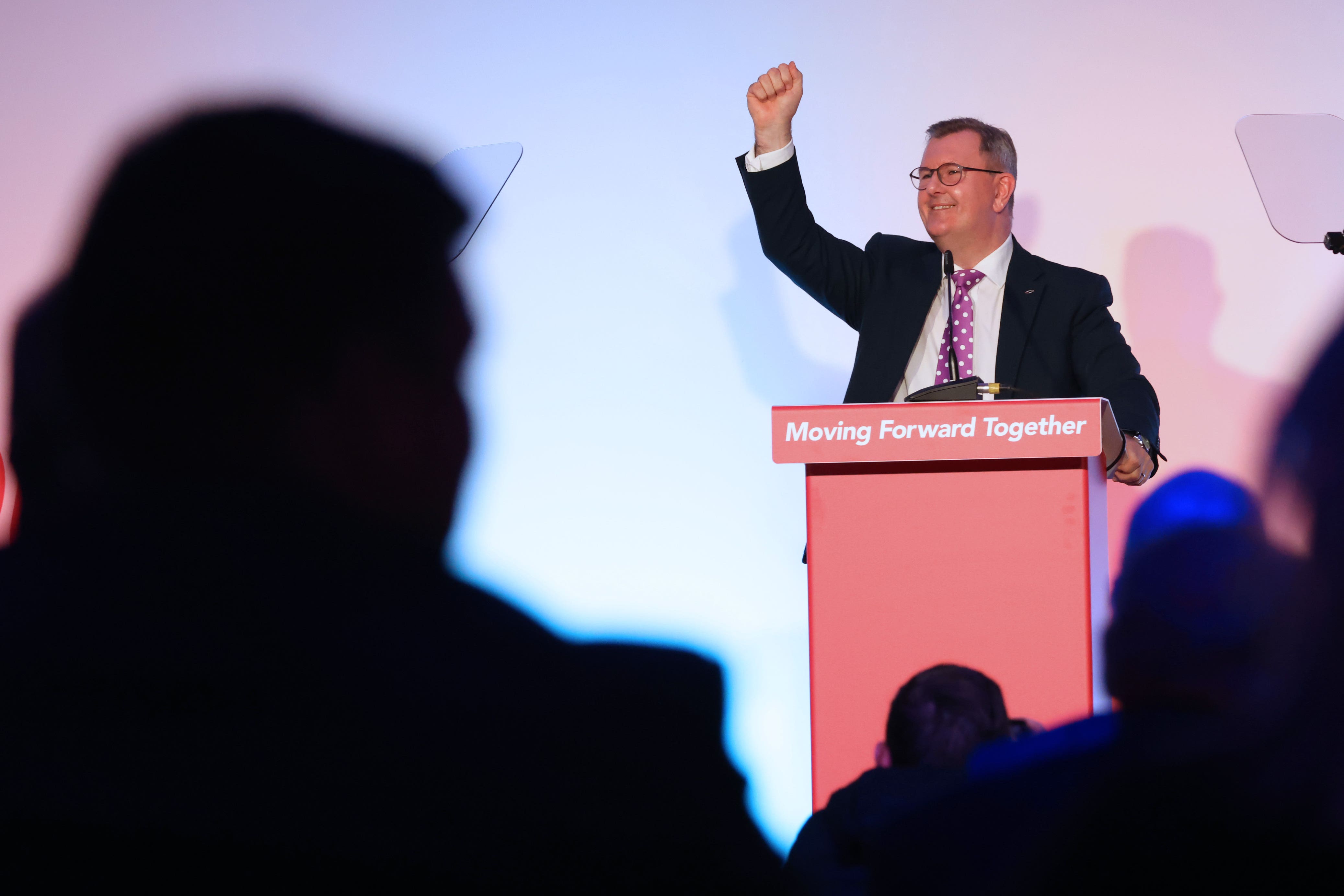Donaldson: No powersharing for DUP while Irish Sea border remains
The party leader told his annual conference changes must be secured to the controversial Northern Ireland Protocol.

Your support helps us to tell the story
From reproductive rights to climate change to Big Tech, The Independent is on the ground when the story is developing. Whether it's investigating the financials of Elon Musk's pro-Trump PAC or producing our latest documentary, 'The A Word', which shines a light on the American women fighting for reproductive rights, we know how important it is to parse out the facts from the messaging.
At such a critical moment in US history, we need reporters on the ground. Your donation allows us to keep sending journalists to speak to both sides of the story.
The Independent is trusted by Americans across the entire political spectrum. And unlike many other quality news outlets, we choose not to lock Americans out of our reporting and analysis with paywalls. We believe quality journalism should be available to everyone, paid for by those who can afford it.
Your support makes all the difference.The leader of the DUP has warned the Prime Minister that the party will not return to powersharing in Northern Ireland unless “decisive action” is taken to remove Brexit’s Irish Sea border.
Sir Jeffrey Donaldson told delegates at the DUP conference in Belfast that changes must be secured to the controversial Northern Ireland Protocol, either through renewed talks with the EU or by unilateral action at Westminster.
The DUP is blocking the functioning of the powersharing institutions in Belfast as part of its protest against arrangements that have created barriers on the movement of goods between Great Britain and Northern Ireland.
Political opponents have heavily criticised the DUP boycott, insisting it is hampering efforts to support families struggling amid the cost-of-living crisis.
The DUP says the economic border between Great Britain and Northern Ireland is exacerbating the inflation crisis and underlines the need for action.
The UK Government has vowed to secure changes to the protocol, either by way of a negotiated compromise with the EU or through proposed domestic legislation that would empower ministers to scrap the arrangements without the approval of Brussels.
There are concerns the latter approach – the Northern Ireland Protocol Bill – could spark a trade war with the EU.
Let me be clear - either the Prime Minister delivers the provisions of the Protocol Bill by legislation or by negotiation and ensures that our place in the United Kingdom is restored or there will be no basis to re-enter Stormont
However, relations between the UK and EU appear to have improved since Liz Truss became Prime Minister and both London and Brussels have been talking up the potential for striking a deal through a fresh round of negotiations.
Sir Jeffrey told the DUP conference he did not mind whether changes were secured by way of negotiation or unilateral action at Westminster.
“The issue of which route is travelled – whether the talks with the EU are successful or whether the Protocol Bill at Westminster becomes law – is not actually the dominant question,” he said. “For us what is important is the destination reached.
“So let me be clear – either the Prime Minister delivers the provisions of the Protocol Bill by legislation or by negotiation and ensures that our place in the United Kingdom is restored or there will be no basis to re-enter Stormont.
“On this issue it is not words but actions we need to see, and we will judge any outcome on the basis of actions not words.”
Sir Jeffrey said the issues with the protocol would not simply be resolved by reducing the number of checks on trade, as he insisted the “underlying problem” was the fact Northern Ireland is subject to a set of laws imposed by the EU without local politicians having any influence or say on how those laws operate.
“As Great Britain has secured its freedom to de-regulate or move in a different direction of travel on aid or taxation, Northern Ireland is going to constantly face new barriers because we are tied to a different set of laws,” he said.
“That is simply not sustainable and is incompatible with devolution, which requires the support of unionists as well as nationalists if it is to function.
“For the benefit of those watching in London and Brussels, let me restate our clear commitment.
“If decisive action is taken on the protocol that restores our place fully within the United Kingdom, then yes this party will take its place once again in a fully functioning executive.”
Sir Jeffrey said his position was supported by tens of thousands of unionists in Northern Ireland.
If powersharing is not restored by October 28 the Government assumes a legal responsibility to call a fresh Assembly election.
Sir Jeffrey said: “We do not fear the prospect of a fresh election, far from it. If in the absence of his Government righting the wrongs visited upon Northern Ireland, the Secretary of State (Chris Heaton Harris) calls an Assembly election, we are ready and we will take our case to the people as the lead party of unionism because we have never been afraid to take our case to the people.
“We will campaign as never before to secure a further fresh mandate from the people. “The Government needs to tread sensitively and act wisely if they wish to see unionist confidence rebuilt and the conditions created for durable powersharing.
“The prize of moving on from the long shadow of the Northern Ireland Protocol is great.”
Sir Jeffrey also used his speech to call for greater co-operation between unionist parties as he claimed pro-Union seats were lost in May’s Assembly election due to splits within the unionist electorate.
The election saw Sinn Fein overtake the DUP for the first time to become the largest party in Northern Ireland.